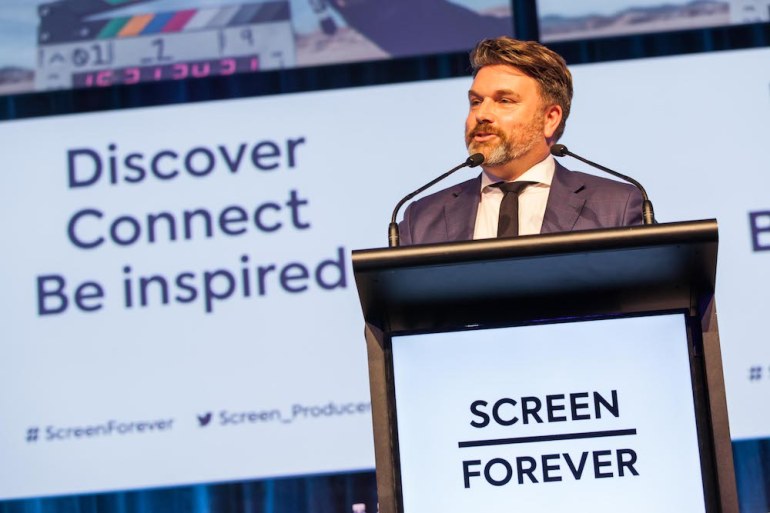SPA CEO Matthew Deaner addresses Screen Forever.
Screen Producers Australia would like to see a unified, singular industry strategy to help take Australian stories to the world.
In his opening address to the organisation’s annual Screen Forever conference, SPA CEO Matthew Deaner put forward an argument that small to medium enterprises – that is, most Australian production companies – are the best placed to navigate a changing, globalised screen industry.
They’re the most likely, in his view, to provide “efficient, nimble and creative” return on government investment in the sector through the “long tail” benefits of building and exploiting their own IP.
However, Deaner noted that export rates on Australian screen content are lower than they were 10 years ago, despite the fact almost half of Australia’s production companies generate export revenue compared with only 7.6 pre cent of broader Australian businesses.
At present, Australia imports $1.5 million more content than it exports, and the CEO is keen to see that “clawed back”.
From SPA’s perspective, there are several key issues that have impacted the state of the industry in the past year, not least of which is the impending second wave of streaming services like Disney+, AppleTV+ and Quibi and an ongoing lack of government response on SVOD regulation.
“Without regulation of content on streaming services the bandwidth offered to the public will be locked up with vertical integration of the large studios into the emerging distribution pipes,” Deaner told delegates.
Other issues include declining audiences on linear broadcast, which Deaner argues has seen FTA networks decrease “investment, promotion and shelf space exposure to forms of content that are harder to monetise”; a strain on the traditional subscription television business model; threats to content investment at the ABC as it grapples with funding cuts; and fewer feature films being produced.
Further, SPA sees stimulus to foreign production via recent adjustments to the Location and PDV incentives as having benefitted only parts of the sector, with domestic production facing issues with access and costs associated with crews and facilities. Producers are also facing downward market pressure and disadvantages via “unchecked deals to the benefit of either international competitors who operate in more favourable market conditions or those who commission content from producers.”
Yet, looking forward, Deaner sees opportunity in the global marketplace, with great potential for local producers to increase their export revenue.
With the right strategies put into place, Deaner expects a broader range of production companies, particularly smaller companies, can increase their export earnings, as well as the territories they sell to – right now most of the export income in the sector comes from the US and the UK. In regards to the latter, SPA has been pushing for an official co-production treaty to be included as part of the potential Australian-European Union Free Trade Agreement.
While the UK and Canada have co-ordinated strategies for their industries’ international development, Deaner noted Australia is yet to do so.
“Part of our challenge is the multiple governments, agencies and bodies that present our industry to the world when what we need is a unified and singular industry centric approach focused on IP for a global return,” he said.
In that regard, SPA formed the Screen Export Advisory Council in April to “get things moving”. The council is co-chaired by former Labor leader and Arts and Trade Minister Simon Crean and former NSW Minister for Tourism and former trade commissioner in Germany and New York Bruce Baird. In his speech, Deaner outlined several core goals for the council:
- Increasing the number of markets providing export revenue;
- Increasing the number of co-production treaties and MOUs (Australia has only 12 compared to Canada’s 60);
- Increasing the number of official and unofficial co-productions that are made; and
- Growing the skills and capacity of the industry to better take advantage of export opportunities.
“Given the power of our medium, our industry has a core role to play in protecting our nation’s interests. To unite and inform the nation and ensure people can see themselves reflected on screen and in their own lives. Our values and Australian culture are then able to be shared globally,” said Deaner.
“At our heart is storytelling, a necessary human experience. It is something that will survive through technological disruption, but we will need to get things right now to capture the extensive export opportunities on our door and to ensure our storytellers keep telling stories for future generations.”


